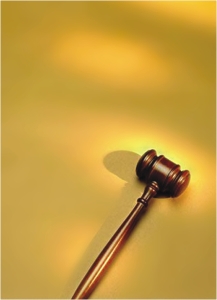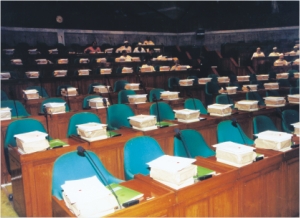
Inside
|
Checks and Balances Jalal Alamgir and Asif Saleh caution against excessive power for the executive
These questions often lead to discussions about the need for more checks and balances to the executive power. In order to move away from the unchecked power of the premiership, agreement between the political parties must be achieved in the upcoming dialogue. This article discusses various options, some feasible within the current constitution, and others that require constitutional amendments, to bring about a much-needed balance of power. The case for checks and balances There is a broad agreement that for all of our constitutional history going back to the Raj, the executive branch had been much stronger than the legislative and the judicial branches. Indeed, under our system of pre-1/11 democracy, all powers were concentrated in the hands of the prime minister (or whomever she delegated those powers to). This system made confrontational politics inevitable. And if there is no change to the system, a simple reshuffling of the party leaderships will not result in any qualitative improvement in our politics. There are a number of ways through which the power of the executive can be trimmed. The need for an independent judiciary is well-recognised. Devolution of power to local government is another idea worth discussion. In addition, an idea that is making the rounds in our chattering circuits is to have a more powerful presidency. But there are strong reasons to be wary of this last idea. Beware the imperial presidency In Bangladesh, the parliament is directly elected, whereas the president is currently elected by the parliament. If an indirectly elected president is given the power to dissolve the popularly elected parliament, there is a fundamental contradiction in the representative nature of the system. Although a direct election to the post of presidency can be considered, perhaps akin to the French model, it will also be a recipe for gridlock within the extremely polarised political climate of Bangladesh. Given the inherent risks of imperial presidency and the complexities required in balancing its power, we should focus attention instead on other ways of improving checks and balances, with more representation from the people in these decisions. Empower parliamentary committees And the constitution does not need to be amended to make the standing committees more powerful. All that is required is commitment to democracy by all vying for power after the election. Such commitment is not unprecedented. During the 1996-2001 Hasina government, every bill passed through the parliament was first scrutinised by bipartisan committees. This was in sharp contrast to the first Khaleda government (1991-1996), where, as research by Nizam Ahmed of Chittagong University reports, only seven out of the 173 bills passed by the parliament was sent first for scrutiny by committees. This sorry trend was repeated by the second Khaleda government. This big difference in democratic performance had everything to do with the political predisposition and the will to make democracy work and nothing with creating new institutions. Vet national appointments Similar arrangements can be made in Bangladesh such that appointments to key cabinet posts (home, defence, finance, law, local government), senior judges, and independent commission chiefs (Election Commission, Anti-Corruption Commission, Human Rights Commission, Public Service Commission) have to be vetted and confirmed by parliamentary committees. Similarly, major purchase/procurement decisions, made by cabinet committees, could be made subject to regular review by the relevant standing committees. Limit ministerial powers Second, abolish the posts of deputy minister and state minister. These posts are often handed out merely as rewards and punishments. They are a drain on national resources, and they not only create multiple chains of command but also increase corruption. Finally, to ensure that MPs have more self-dependence and less fear of retribution, a two-term limit for the prime minister can be introduced. This will ensure that new leaders to take over the premiership will constantly be nurtured in the political parties, making room for fresher ideas and new changes. The first two can be implemented by agreement among parties; the final measure would require a constitutional amendment. Repeal Article 70 The supporters of Article 70 point to the article's historical background. In the pre-Ayub Pakistan, parliamentary majorities changed frequently. At one stage, Pakistan had four prime ministers in 30 months. During the end days of Ayub's rule, in the negotiations between the army and politicians (including Sheikh Mujib), this parliamentary horse-trading came up as a reason against the parliamentary form of government. To negate that criticism, politicians proposed the idea behind the Article 70. However, recent history suggests that the article by itself provides no safeguard against auctioning of MPs. For example, the April 30, 2004 political drama allegedly involved bribing MPs to cross the floor and bring down the government. If enough MPs wanted to defect, the article would not suffice in keeping a government in power. To make party switching unattractive, a better alternative is to make at least three years of party membership mandatory to receive a party nomination -- and this can be done via electoral laws. The repeal of Article 70 will enable MPs to vote their conscience, which would increase local representation and go a long way toward reducing the unchecked power of the PM. Allowing vote across party lines would also make the parties more careful and serious about resolving both intra-party and national issues, as they would always be in fear of defection or "crossing the floor.” Do we need a whole new system?
without having to restructure the entire system altogether. The basic structure of the system should be continued; it is familiar to all of us, and most of all, we know very well where the leaks are and where it is broken. Our challenge is to address specific deficiencies judiciously and to consolidate its existing strengths. Introducing a whole new system, as some quarters would like to do, is not the answer, for it will introduce not only new levels of confusion and battles in an already exhausted polity, but also many unforeseen pitfalls simply because we cannot foresee how an alternative system would work out practically. If politics are to be brought closer to the people, it needs to be done first with what is already familiar to the public. We need a return to stability, not comprehensive experimentation. Some of the suggestions mentioned above, such as repealing Article 70 and putting term limits for the prime minister, will require constitutional amendments, which will need to be brought by political parties through a deliberative and constitutional process after the elections. As the caretaker government begins formal conversations with political parties, it would do itself a great service if it can drive the parties toward recognising that some of these changes are necessary toward instituting greater checks and balances. And the key to enhancing checks and balances, which we sorely need, is to bring power closer to the people through strengthening processes of bipartisan decision-making in the parliament and local levels. Although, at the end of the day, it is our mindset that has to be democratic, formal checks and balances will help prevent the rise of a pre-1/11 kind of political crisis rooted in a gross abuse of power. Jalal Alamgir is assistant professor of political science at the University of Massachusetts, Boston. Asif Saleh is Executive Director, Drishtipat. |
 A
A